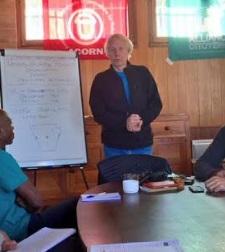By Wade Rathke in Columbus Free Press September 22nd, 2018
In building an organization sustainability and self-sufficiency are essential, but money is not what drives the creation and survival of an organization. There is no amount of money that can substitute for a clear and solid organizing plan. In organizing, I always encouraged people not to worry about the money, but to first make the plan, focus fully on that, and totally believe that if the plan is good enough, then resources will follow. In expressing this principle at ACORN, I would always say, “rain follows the plow.” What in the world could that have meant? In the “manifest destiny” development of America and its drive to populate the vast lands from coast to coast, unscrupulous land promoters launched thousands of “prairie schooners” on the sea of the western plains by dangling before landless farmers the dream that “rain follows the plow.” In truth, the western states were environmentally a desert, rather than the anthem’s “fertile plains,” but the hucksters were arguing that famers could break the soil and that would trigger rain. In farming, we now all know better. But, in building any kind of organization, the organizing plan is in fact the plow that breaks the ground, and money will in fact “rain” to grow the organization, if the plan is sound and followed steadfastly. I realize that what I’m advocating sounds more like magic than a dependable tool that will build an organization, but I totally believe – and this has been my experience for decades – that an organizing plan is the a priori that drives money to support organization building. This is especially true if the organization is about social change and building power. Money that comes separate from a plan is merely transactional and though it may open some doors and allow some doors to stay open, if such resources are independent of the fundamental organizing plan, they will distract the organization, and are as likely to kill it, as grow it.An organizing plan is not a mission statement. A mission statement is frequently just a carefully crafted group of words, more often as not to attempt to satisfy a funder. An organizing plan is something that can be explained and shared. Such a plan is clear and concrete, and can then create the enthusiasm and support that will trigger deep and lasting commitments. An organizing plan demands commitments, hell or high water, for years from people to make it real. The kind of commitments that led families to pack up everything they owned and head for the unknown in Oregon or California, risking their lives, and building new lives, albeit displacing native people. An organizing plan articulates the broad steps and objectives to achieve an important future. A plan doesn’t need a story, it tells its own story. An organizing plan is something that is bigger than any of us, while encompassing all of us. For ACORN in the mid-1970s, building organization in twenty states by 1980, the 20/80 campaign, was such a plan. The critical component was the commitment of members, leaders, and organizers to implement the plan in the now sadly archaic statement “by any means necessary.” Certainly, it would cost money, but the ways and means of the finances was a presumption, an afterthought, or a collateral result, not an inspiration or a first order of business If the plan was good, the commitments were strong, and the goals were right, the money would come, somehow, sooner or later. There’s no “quit” in making an essential organizing plan to build an organization. There can’t be “ifs, ands, or buts.” There has to be enough drive that there is no such thing as obstacles that will stand in the way. The assumption has to be that success is inevitable, even if unpredictable and impossible to fix on a specific timetable or assign on the calendar. When organizers say, we will do such and such, “if we can raise the money,” what they are really saying is that they are not sure that the such and such is important enough to the organization or to themselves to assure that it will in fact be done. Such an organization may not be worth your time and trouble. The promoters may be trying to convince you that there’s rain in the desert, but if money is what the organization depends on for its growth and success, then the plan isn’t strong enough to realize an independent and powerful future.

